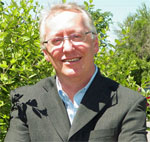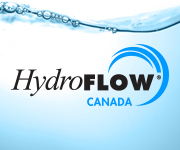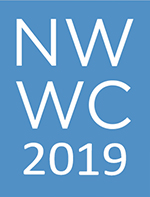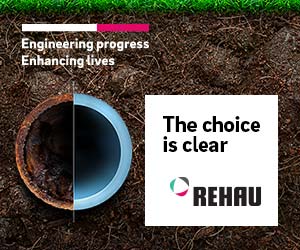 |
||||||||||
| Subscribe | Past Issues | www.cwwa.ca | Water Source Magazine | ||||||||||
|
CWWA News
Conference season has begun, so I write this month’s column from Montreal where I am participating in Réseau Environnement’s Americana event. This biannual conference addresses all aspects of the environmental and clean tech industry and hosts a uniquely international trade show. Next I’m off to Washington to witness the advocacy efforts of WEF, NACWA and AWWA. Recently, Health Canada published revised guidelines concerning lead (Pb) in Canadian drinking water. The most significant change is the reduction of the Maximum Allowable Concentration (MAC) of lead in drinking water from 0.01 mg/L to just 0.005 mg/L. (Details on lead and the national Guidelines are in the attached Fact Sheet)
Be part of the Conference - submit a presentation proposal - deadline extended to April 15 Member News
The Conversation Kevin Quigley, a collaborator on CWWA's project to assess the Resilience of Canadian Water Systems authored this article highlighting the results of our survey and the need for ongoing research and investment. March 22 marks World Water Day, an acknowledgement of the importance of safe, clean drinking water. This year, the celebration takes place against the backdrop of water shortages. The United Nations has concluded that there is an international water crisis, and the principal failing is one of governance. Cape Town is the latest crisis, but we can only expect water shortages to become more common. Clearbrook Waterworks District has retained its title as the “World’s Best Tasting Water”. This is the 2nd year in a row, and an unprecedented 6th time, for Clearbrook to win the GOLD medal at The Berkeley Springs International Water Tasting event (known as the Academy Awards of Water Tasting) Clearbrook is cited as the biggest winner in the event’s history with 6 golds since 2009 – and 3 in just the last 4 years! Plus some Silver and Bronze thrown in there too. Clearbrook Waterworks District serves a portion of Abbotsford, BC, just east of Vancouver. They have been providing delicious and safe drinking water since 1954 and CWWA is very proud to have them as members. For more info, see the attached News Release Operators Without Borders (OWB), is a Canadian Charity that dispatches volunteer professional Water and Wastewater Operators to assist countries during times of crisis or for educational and mentoring relationships. OWB assigned a team, at the request of BWS, to interact with Belize Water Services Limited (BWS) staff and provide training and field evaluation of their country wide water and wastewater Federal Initiatives
On March 1, 2019, the Government announced an investment of $1.7 million over the next two years for 8 projects to enhance surveillance and monitoring of infectious diseases linked to climate change. Funding is provided through the Infectious Disease and Climate Change Fund which is now accepting proposals from interested applicants for future funding opportunities. Health Canada is currently consulting on three proposed guidelines on drinking water quality – cadmium in drinking water, total coliforms and natural organic matter. Environment Canada has circulated two documents for discussion among the Work Group on Substances. The first discusses ways of tracking the success of pollution prevention programs. The NPRI currently requires facilities to report their pollution prevention (P2) information at the facility level. However, P2 activities often apply to individual substances. Provincial News
On February 15, 2019, WorkSafeBC posted Safe Work Practices for Chlorine. The manual is relevant for employers whose businesses include the use of chlorine gas for water or sewage treatment; and workers who work with or around chlorine gas, including those who repair or maintain chlorine systems. On February 21, 2019, Sylvain Gaudreault, Member for Jonquière, introduced Bill-194, An Act to ensure compliance with Québec''s climate change-related obligations. The bill stipulates that any proposed bill, regulation or other act of a regulatory nature, government draft guideline, draft policy or draft action plan must be compatible with achieving GHG reduction targets. Furthermore, the bill would require the Minister to take into account a project’s greenhouse gas emissions and reduction measures prior to granting environmental authorization. On March 1, 2019, Newfoundland and Labrador Environment Minister, Graham Letto, launched The Way Forward on Climate Change. The five-year plan includes 33 actions the province says are designed to reduce provincial greenhouse gas emissions, and 17 strategies for building resilience to climate change. These directions include plans to encourage the use of more electric vehicles, implementing the Made-in-NL carbon pricing program, and increasing energy-efficiency in housing units and office buildings.The report also lays out the need for the province to build climate resilient infrastructure and decrease the reliance on diesel electricity generation for communities in the province that are off-grid. Snippings & Clippings
There is no known safe blood lead concentration in children. Lead is a neurotoxin that can cause chronic medical and behavioral health problems in children [1–4] and is arguably the most prevalent pediatric toxin of environmental origin in the United States [5]. Mean lifetime BLLs as low as 1.0–10.0 lg/dL are inversely associated with children’s IQ scores [1,2]. Epidemiologic studies have demonstrated that Water Online After a long period of totally inadequate funding for critical water projects, the tide appears to be turning and funding is becoming more readily available. Water Online Residents of an Iowa town were told not to drink their tap water this month when dangerous levels of manganese were found in the supply. And most concerning may be the fact that nobody seems sure how long the contamination has been affecting residents Municipal World Over a 77-day period in Summer 2017, 272 wildfires resulted in 149 evacuation changes throughout British Columbia’s Cariboo Regional District (CRD). From July 6 to September 20, more than half of their residents were put on evacuation alert or order covering 48,099 square kilometres, making it the largest land evacuation since the 1950s Red River floods. Journal of Environmental Management The use of Low Impact Development (LID) alternatives requires the establishment of appropriate regulations and guidelines on acceptable practices and developing consensus among stakeholders, thus assuring the rights of all water-users and for conflict resolution. This content analysis aims to examine whether stormwater regulations and guidelines have addressed the use of LID alternatives in urban settings and compares the current state of regulations in the context of Canadian provinces and territories., A list of eight core criteria relevant to the implementation of LID has been identified and an ordinal scale ranging from 1 to 6 is proposed to track the progress towards LID-friendly regulations in each province. Furthermore, based on comparative assessment, Canadian provinces are categorized into three groups: ‘highly, moderately, and slightly LID-friendly’ to project a broad view of the current state of regulations required to promote LID alternatives. . The London Free Press The voracious use of toilet paper in the United States — with the average American using almost three rolls each week and major manufacturers spurning alternative fibres — is destroying Canada’s forests and causing widespread environmental damage, two international environmental groups say. |
||||||||||









